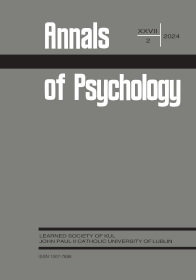Polish Adaptation and Validation of the Penn State Worry Questionnaire for Children (PSWQ-C): Factor Structure, Reliability and Validity
Polish Adaptation and Validation of the Penn State Worry Questionnaire for Children (PSWQ-C): Factor Structure, Reliability and Validity
Author(s): Elżbieta Barbara TalikSubject(s): Social Sciences, Psychology, Clinical psychology
Published by: Towarzystwo Naukowe KUL & Katolicki Uniwersytet Lubelski Jana Pawła II
Keywords: worry; Penn State Worry Questionnaire for Children; Polish adaptation of PSWQ-C; children and adolescents
Summary/Abstract: This study presents the Polish version of the Penn State Worry Questionnaire for Children (PSWQ-C). The validation of the PSWQ-C in Poland was conducted through two studies. Study 1 examined the initial factor structure, internal consistency, and construct validity of the PSWQ-C in two samples of school students (N = 819) aged 8–19 years (M = 14.63, SD = 3.09). Study 2 involved 620 participants aged 8–19 years (M = 14.35, SD = 3.42). We conducted Confirmatory Factor Analysis to compare the initial factor structure with different models mentioned in the literature. The results suggest that the scale has good psychometric properties, including good reliability and acceptable validity. The factor structure that showed the best fit to the data consisted of one general worry factor and two method factors representing wording effects. This study is part of a broader discussion on the factor structure of the PSWQ-C. The results suggest that the questionnaire is homogeneous and measures one latent variable, worry, despite a bifactorial model being the best fit for the data. The two sub-factors do not have any psychological meaning (“non-worrying”), but are only an effect related to the positive or negative wording of the scale’s statements.
Journal: Roczniki Psychologiczne
- Issue Year: 27/2024
- Issue No: 2
- Page Range: 119-139
- Page Count: 21
- Language: English

